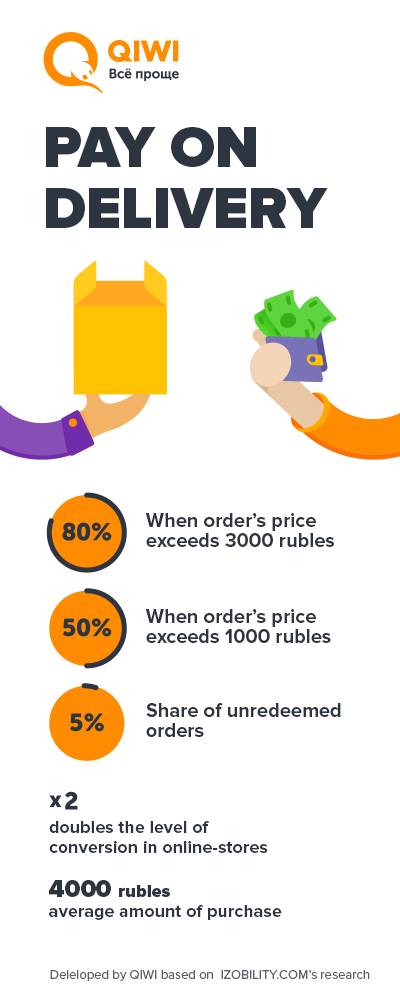
Russians buying from foreign online stores prefer to pay on delivery
27.03.2018
China’s mobile payment posts robust growth in 2017
03.05.2018QIWI: Payment on Delivery brings about exponential growth in e-commerce traffic

 The QIWI group has come up with a new concept for cross-border e-commerce. Its distinctive feature is that, on top of strong traffic, retailers and logistics companies get the opportunity to focus on their own business objectives without being distracted by non-core functions, primarily financial. It also eliminates the distinction between domestic and cross-border orders in terms of how they are paid. Stanislav Saveliev, Head of E-commerce, and Badma Budaev, Projects Development Manager, QIWI, discuss Payment on Delivery with us.
The QIWI group has come up with a new concept for cross-border e-commerce. Its distinctive feature is that, on top of strong traffic, retailers and logistics companies get the opportunity to focus on their own business objectives without being distracted by non-core functions, primarily financial. It also eliminates the distinction between domestic and cross-border orders in terms of how they are paid. Stanislav Saveliev, Head of E-commerce, and Badma Budaev, Projects Development Manager, QIWI, discuss Payment on Delivery with us.
R&L: To start with, how would you describe what is going on in e-commerce?
SS: In recent times this segment of retail has been growing, and it has been non-stop growth. There is still a long way to go compared to a lot of developed economies, but on the basis of the parameters we are seeing today we can safely expect the Russian market to double in size. Cross-border, where we operate, is growing even faster both in rouble and percentage terms. Over the last 4 years, since 2014, its share has soared from 5% to 30%, triggered mainly by the emergence of AliExpress whose share in this segment we would set at about 80%. But it is bound to go down in the long term – firstly, with the advent of new independent players, not only from China, but also from Europe and America. There has recently emerged another global player, South Korea, clearly with good opportunities ahead.
R&L: How is Russian e-commerce affected by cross-border growth?
SS: Cross-border growth is no doubt a bad thing for domestic players. But it is a reality you have to accept. At the end of the day it is the buyer who wins, because he gets a better and cheaper product. We at the QIWI group intend to build an ecosystem to help unify many of the factors that differentiate cross-border from domestic. One of the highlights here is a secure transaction service within QIWI, which we are testing on the largest marketplaces in this country. The first thing we want is develop an e-commerce ecosystem for buyers. It is one of the global trends that go-in-betweens are gradually edged out from the purchase process and a closer relationship is established between the buyer and the producer. We contribute to this relationship by developing the direct B2C segment.
R&L: Russian buyers are known for their propensity to pay on delivery, typically in cash, without prepayment. Is that changing?
BB: It has to be remembered that historically the Russian economy emerged for the most part as a cash-driven economy. According to the Bank of Russia, back in 2014 every Russian had at least one bank card, but the percentage of wire transactions on these cards was pretty low. Holders used their cards mainly to withdraw cash from ATMs. This is now changing. People are increasingly using cards to pay for purchases and services.
E-commerce was initially a very fragmented market, with a lot of sellers, which made the buyer feel suspicious. And in fact this is the key reason why COD [cash on delivery] is so popular. There are many more other ways to pay now – as an example, by card to the courier on a mobile POS terminal. QIWI’s recent experience suggests that for orders above 10,000 roubles, bank cards are used in 10% of purchases. The smaller the purchase, the lower this percentage, because people always have some cash in their pockets. Cash payments in e-commerce will continue to prevail over the next 5-10 years. Six years ago, there were serious projections saying that cash would become almost completely extinct. Five years down the line – cash is alive and kicking.
R&L: It is normal practice for foreign online stores companies to require a prepayment. Does this apply to Russia only or is it global practice?
BB: Most global platforms indeed require prepayment. But I don’t think it is deliberate policy or something of that kind. This is the way they operate. Prepayment is long-established practice in the US or China. And when companies from the US or China reach the Russian market, they do not feel like changing the rules or complicating things.
R&L: We have touched upon something very important for business and market development – the buyer’s psychology. The service you offer targets those who have never bought from abroad, primarily for lack of trust. Is that so?
SS: Trust is something that takes a long time to build up on the market. If you look at how e-commerce ecosystems were developing in other countries, consumer trust in China, for example, has largely been driven by Alipay. Sadly, it was different in this country.
About every third purchase made today is a cross-border purchase. Two thirds more people do not buy from abroad at all, precisely because they fear they may be cheated or may lose their money. As regards such well-known platforms as Amazon, people don’t buy from them simply because it is too expensive. Our service aims, above all, to remove a psychological barrier of mistrust about an online store for those who don’t pay in advance on principle. There are other groups of buyers who don’t want their money to get frozen over the period of delivery from the store. And by the way, if you eliminate cash on delivery from Russia now, the share of e-commerce will plunge about seven times.
R&L: What is the QIWI project about and what does it bring to buyers?
SS: It is as simple as that: paying an order at a foreign online store looks just the same as if you were buying from Russia.
QIWI makes a contract with a merchant, for example, in China. We get integrated into retailer’s checkout. As soon as we see that the buyer has placed an order we transfer the money to China under a factoring agreement, meaning that we finance that transaction. The merchant transfers the product to the logistics company, and we monitor order progress on an ongoing basis because we are integrated with the logistics company. We then get the money given to the courier. We intend to take care of any problems associated with cross-border on the side of logistics companies and merchants and to close the existing gaps in the classic cash on delivery using our financial infrastructure. Every party involved has its benefits.
The objective is that you acquire user experience in e-commerce and become a buyer, specifically cross-border, irrespective of where you buy from. The problem is that when you order and buy from abroad you don’t fully understand where and from whom you are buying. We want to create trust between the Russian online consumer and the foreign platform where you are placing your order. At the same time, we want to ensure full transparency in the transaction for the online store. The buyer pays only when the logistics company has delivered the order. In this context QIWI ensures that the transaction is transparent for the store. And as an option, as a financial centre and bank (we do carry a banking license) we can give credit to that store from the consumer’s side. In other words, the store gets the money for the specific order without delay – indeed, instantaneously.

R&L: It looks like an advance payment, doesn’t it?
SS: Precisely. It is an advance payment we transfer to the store against the orders made by Russian buyers.
R&L: Imagine I make an order and change my mind an hour later. You have already paid and delivery doesn’t take place. What happens?
SS: All risks are tracked through data integration between QIWI and the vendor’s platform, between QIWI and the logistics. We are also thinking of how QIWI could communicate with customers directly – these are plans for the future. Given that QIWI’s payment infrastructure is in place and ensures full transparency, we can work with each transaction individually. We receive information/We know [Только нам известно] that a transaction was cancelled, for example, by the store. All this makes financial payments fully transparent, which is not the case with the classic cash on delivery and goes beyond the competence of logistics companies. There are different options for financial management: you can cancel transactions or take certain amounts out of the ongoing cash flow from QIWI to the store or you can choose not to finance the next payment. This is how an offset mechanism works, and QIWI is part of it infrastructurally, through its processing.
R&L: What benefits does it bring to logistics companies?
BB: The logistics company – in our case the DPD Group – earns profit on payments made for shipping. Being a vertically integrated company, DPD offers a full range of services they can provide in conjunction with their partners. Its fee includes what it gets for cash collection. Given that QIWI is available at online store’s checkout as a payment option, the company starts interacting with the buyer before DPD contacts the buyer. That is how we generate strong traffic and start getting all the orders, meaning that the logistics company has all shipment traffic. That is how we guarantee a strong flow for the logistics company’s key business. I’d like to stress that DPD was the first company we integrated with, but we are open to cooperation with other companies as well.
R&L: And how about currency conversion?
BB: The option to convert is available on any QIWI functionality whenever there is a difference between the currencies of payment and settlement. In simple words, the benefit of using the new solution is that it helps buy from abroad as easily as you can do so in Russia. For the retailer’s marketing department it is a tool to boost sales.
R&L: Typically, this is available to buyers from major cities. Are there any regional restrictions in place?
SS: There are no restrictions on our side. A logistics partner may potentially be limited to the geography of its operations. At the first stage, DPD’s involvement opens up broad horizons because DPD has good coverage. QIWI will do what it takes to reach out to all regions in this country in the very near future. And the key criterion here is, of course, traffic.
Contacts
Stanislav Saveliev, Head of E-commerce, QIWI
s.savelev@qiwi.com
Tel .: +7 (495) 783-59-59 ext. 6170
Badma Budaev, Project Development Manager, QIWI
b.budaev@qiwi.com
Tel .: +7 (495) 783-59-59 ext. 6172

